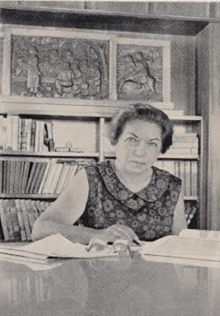
Bracha Habas (20 January 1900 – 31 July 1968) was an Israeli journalist, literary editor and writer. [1] She is being considered as “one of the first professional women journalists in Israel.” [2]
Biography
Born on 20 January 1900 in Alytus, southern Lithuania, Bracha Habas moved to Palestine with her family in 1906. After the completion of her school education, she enrolled at the Training Seminary for Women Teachers where she graduated in 1921. [3] [2]
In 1919 she joined the socialist-Zionist party, Ahdut HaAvoda through which she started empowering the young working women. [4] [3] In 1926, she went to Germany to enroll at Leipzig University to advance her knowledge of pedagogical theory. On her return she worked with the schools that were associated with Women Teachers’ Seminary. [3] [2]
She later began her professional career in journalism. She periodically wrote editorials, stories and reports in a number of leading newspapers. [2] She also served on the editorial board of the newspaper Davar and of the Am Oved, a books publishing house. [5] [6] She was also sent to the Zionist Congress, Zürich as its correspondent by the Davar newspaper. She briefly worked in educating the rural youths. [2]
In 1946 she married David Hacohen, an Israeli politician and diplomat. [3]
She died of cancer on 31 July 1968. [2]
Publications
Some of her publications include [3] [2]
- Ḥomah u-Migdal (1939)
- Korot Ma'pil Ẓa'ir (1942)
- David Ben-Gurion ve-Doro (1952)
- Pagodot ha-Zahav (1959)
- Benot Ḥayil (1964)
- Ḥayyav u-Moto shel Joop Westerweel (1964)
- Tenu'ah le-Lo Shem (1965)
- He-Ḥaẓer ve-ha-Givah (1968)
References
- ^ Zertal, Idith (11 July 2005). Israel's Holocaust and the Politics of Nationhood. Cambridge, England: Cambridge University Press. p. 50. ISBN 978-1-139-44662-4. Retrieved 20 November 2022.
- ^ a b c d e f g Berlovitz, Yaffah. "Bracha Habas". jwa.org/encyclopedia. The Shalvi/Hyman Encyclopedia of Jewish Women. Retrieved 20 November 2022.
- ^ a b c d e Skolnik, Fred (1 January 2006). Encyclopaedia Judaica, Second Edition, Volume 8 (PDF). Stamford, Connecticut: Thomson. p. 173. ISBN 978-0-028-65936-7. Retrieved 20 November 2022.
- ^ Lenṭin, Ronit (2000). Israel and the Daughters of the Shoah: Reoccupying the Territories of Silence. Oxford, New York: Berghahn Books. p. 195. ISBN 978-1-571-81775-4. Retrieved 20 November 2022.
- ^ Shai, Aron (3 June 2019). China and Israel: Chinese, Jews; Beijing, Jerusalem (1890-2018). Boston, Massachusetts: Academic Studies Press. p. NA. ISBN 978-1-644-69088-8. Retrieved 20 November 2022.
- ^ Roskies, David G. (2012). Holocaust Literature: A History and Guide. Lebanon, New Hampshire: UPNE. p. 37. ISBN 978-1-611-68359-2. Retrieved 20 November 2022.

Bracha Habas (20 January 1900 – 31 July 1968) was an Israeli journalist, literary editor and writer. [1] She is being considered as “one of the first professional women journalists in Israel.” [2]
Biography
Born on 20 January 1900 in Alytus, southern Lithuania, Bracha Habas moved to Palestine with her family in 1906. After the completion of her school education, she enrolled at the Training Seminary for Women Teachers where she graduated in 1921. [3] [2]
In 1919 she joined the socialist-Zionist party, Ahdut HaAvoda through which she started empowering the young working women. [4] [3] In 1926, she went to Germany to enroll at Leipzig University to advance her knowledge of pedagogical theory. On her return she worked with the schools that were associated with Women Teachers’ Seminary. [3] [2]
She later began her professional career in journalism. She periodically wrote editorials, stories and reports in a number of leading newspapers. [2] She also served on the editorial board of the newspaper Davar and of the Am Oved, a books publishing house. [5] [6] She was also sent to the Zionist Congress, Zürich as its correspondent by the Davar newspaper. She briefly worked in educating the rural youths. [2]
In 1946 she married David Hacohen, an Israeli politician and diplomat. [3]
She died of cancer on 31 July 1968. [2]
Publications
Some of her publications include [3] [2]
- Ḥomah u-Migdal (1939)
- Korot Ma'pil Ẓa'ir (1942)
- David Ben-Gurion ve-Doro (1952)
- Pagodot ha-Zahav (1959)
- Benot Ḥayil (1964)
- Ḥayyav u-Moto shel Joop Westerweel (1964)
- Tenu'ah le-Lo Shem (1965)
- He-Ḥaẓer ve-ha-Givah (1968)
References
- ^ Zertal, Idith (11 July 2005). Israel's Holocaust and the Politics of Nationhood. Cambridge, England: Cambridge University Press. p. 50. ISBN 978-1-139-44662-4. Retrieved 20 November 2022.
- ^ a b c d e f g Berlovitz, Yaffah. "Bracha Habas". jwa.org/encyclopedia. The Shalvi/Hyman Encyclopedia of Jewish Women. Retrieved 20 November 2022.
- ^ a b c d e Skolnik, Fred (1 January 2006). Encyclopaedia Judaica, Second Edition, Volume 8 (PDF). Stamford, Connecticut: Thomson. p. 173. ISBN 978-0-028-65936-7. Retrieved 20 November 2022.
- ^ Lenṭin, Ronit (2000). Israel and the Daughters of the Shoah: Reoccupying the Territories of Silence. Oxford, New York: Berghahn Books. p. 195. ISBN 978-1-571-81775-4. Retrieved 20 November 2022.
- ^ Shai, Aron (3 June 2019). China and Israel: Chinese, Jews; Beijing, Jerusalem (1890-2018). Boston, Massachusetts: Academic Studies Press. p. NA. ISBN 978-1-644-69088-8. Retrieved 20 November 2022.
- ^ Roskies, David G. (2012). Holocaust Literature: A History and Guide. Lebanon, New Hampshire: UPNE. p. 37. ISBN 978-1-611-68359-2. Retrieved 20 November 2022.